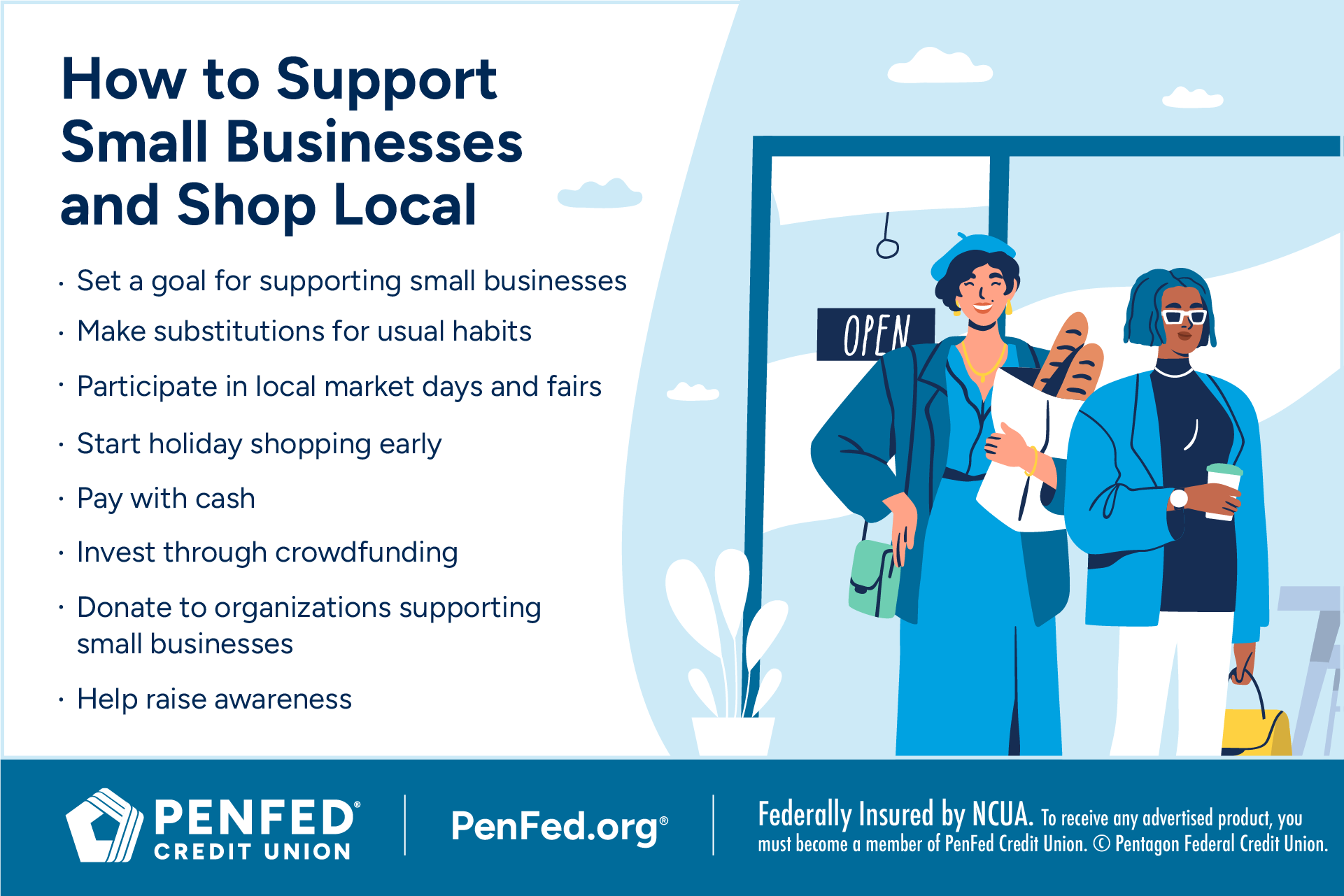Personal Finance
How to Support Small Business and Shop Local (and Why You Should)
What You’ll Learn:How to support small businesses
EXPECTED READ TIME:6 MINUTES
Small businesses are a valuable part of every community. They provide opportunities for entrepreneurship, creativity, and growth in our very own neighborhoods.
Shopping at your closest brand-name grocery store or using Amazon for all your purchases may seem the easier option. But you can just as easily support local businesses that are working hard to compete with bigger chain stores.
Here's how to make that change.
The Importance of Supporting Small Businesses
In an age of massive chains and online retailers who deliver right to your doorstep, you may be wondering why you should support small businesses. The answer is that from employing your neighbors to funding city services, local small businesses help create a community worth living in.
From employing your neighbors to funding city services, local small businesses help create a community worth living in.
Builds Local Economy
Supporting small businesses builds your local economy more than purchasing from big box chains. That’s because more of the money you spend stays in your own community. According to a study by Score.org, every time you spend $1 shopping small…
- 67 cents stays local
- 44 cents goes to the business owner
- 23 cents goes to other local businesses
Keeps Your Community Employed
Around two-thirds of private sector jobs are created by small businesses. In fact, according to some sources, 47% of U.S. workers are employed by small businesses, and that number is even higher in rural areas (54%), where small businesses make up 85% of local establishments.
It’s true that major corporations also create jobs. However, these jobs often come with low wages and limited benefits that most employees don’t qualify for. Because of this, major chains can potentially increase poverty and create hidden costs for local taxpayers, draining money from the area.
Major chains can potentially increase poverty and create hidden costs for local taxpayers.
Keeps Businesses Local
Small businesses tend to shop at other small businesses, and small business employees also tend to shop locally. It’s a way to network, build small business communities, and encourage their neighbors to shop locally, too. This behavior helps all businesses — big and small — thrive.
Many restaurants, for example, like to purchase local produce that is less expensive and hasn’t been stored in trucks and freezers. Businesses that want to sell merchandise, like branded mugs or shirts, can often get a better deal from a local print and design company than a major retailer because of the low quantity of merchandise they sell — a local business is more likely than a nationwide retailer to “work with” other locals on pricing in order to establish an ongoing relationship.
Small businesses tend to shop at other small businesses.
Supports Public Services
State and local governments cover around three quarters of the costs of your local public assets, including 90% of the costs for schools, water treatment, and transportation. The taxes paid by small businesses help cover much of these costs — in fact, they contribute substantially more than their big box counterparts.
Reduces Your Carbon Footprint
Small businesses often have a smaller environmental impact. Making purchases close to home equates to less packaging waste and fewer carbon dioxide emissions and less energy consumption. If you don’t think your purchases make much of a difference, consider that 29% of greenhouse gas emissions in the U.S. are from transportation.
Beyond waste and shipping concerns, small businesses are more likely to use sustainable business practices. In part that’s because it’s often cheaper for them to source their products locally.
Small businesses are more likely to use sustainable business practices.
Offers Better Quality Products
Chain retailers offer more options and a wider variety of products overall compared to small businesses. However, to compete with other major chains, they have to cut costs somewhere — frequently by buying inferior products and employing planned obsolescence so that you have to replace those products more often. This creates a cycle of buying and discarding that hurts the environment and your wallet.
In contrast, small businesses can only buy and stock so many products. Even online businesses have to limit themselves. As a result, small businesses are often more selective about what they sell.
Provides Unique Products
Small businesses have to be creative to compete with industry giants, and they often do this through innovation. You’ll find small businesses filling gaps in the market that larger companies can’t or won’t. And because small businesses have more flexibility than larger corporations, they often offer creative products and services that would be riskier for larger companies to invest in.
Offers a Way to Get Involved
Local businesses tend to become small social hubs in the communities they serve. They network with other small businesses, participate in civic organizations that promote small businesses, and support business incubators that help entrepreneurs launch their own new businesses.
They’re also more likely to give back to their communities by donating to local charities, supporting fundraisers, and providing goods, services, or discounts to schools and other local groups.
Many small businesses become important third spaces where locals can gather. They’re instrumental in giving a city its unique character and helping people feel connected to their neighbors.
Small businesses are more likely to give back to their communities.
What About Small Businesses Online That Aren’t Local?
Not all small businesses are local to your community, but that doesn’t mean there aren’t still benefits to supporting them. Every small business helps create community somewhere, and many of the benefits of shopping at small local businesses apply to shopping at small online businesses, too. Choosing small businesses vs. major retailers means you’ll still be reducing your carbon footprint, supporting innovation, and choosing quality over quantity.

5 Ways to Support Small Businesses
Supporting local businesses doesn’t have to be hard. Here are some simple ways you can get started.
1. Set a Goal for Supporting Small Businesses
You’re more likely to follow through on supporting small businesses if you make a specific goal. It’s best to set a goal that fits your lifestyle and shopping habits, and you can always start small and set harder goals later. If you’re not sure what goal to set, you could commit a specific amount to local businesses, such as:
- A percentage of your purchases (for example, 25% of all purchases for the month)
- A specific frequency of purchases, such as 1 in every 5
- A dollar amount (for instance, $100 of your total purchases every month)
If you love grabbing a coffee on the way to work, try the local place instead of the giant chain.
2. Make Substitutions for Usual Habits
If you love grabbing a coffee on the way to work, try the local place instead of the giant chain. If Friday night is pizza night, take your kids to a local pizzeria instead of your usual place. Skip the Saturday rush at the grocery store and buy fresher produce at a farmer’s market. You’ll likely find some great perks, like better quality and better service.
3. Participate in Local Market Days and Fairs
Many communities have Saturday morning markets, monthly First Friday events, and other regular times when residents are encouraged to support small businesses. This also might mean choosing a local restaurant over your favorite chain for a family meal or stocking up on groceries from your neighborhood market instead of a major retailer. It’s a good time to discover what’s available in your community.
These options may seem to cost more at the time of purchase, but consider how you’re getting much more than what you paid for when you support local business. You’re contributing to your community.
Stock up on groceries from your neighborhood market instead of a major retailer.
4. Start Holiday Shopping Early
If you’re looking for unique, handmade, or artisanal gifts for family and friends, small businesses are the way to go. Local goods can be exotic or nostalgic treats for loved ones who live far off or have moved away. Best of all, by shopping a little at a time throughout the year, you can reduce seasonal stress and support small businesses all year long. You may even save some money.
5. Pay with Cash
Every tap or swipe transaction comes with a fee. At 3%, that starts to eat into a small business’ profits fast, especially for less expensive transactions. When possible, pay cash so that more of your money goes to the business.
Investing in Small Businesses in Your Community
Becoming a customer is a great way to support small businesses, but there are other ways, too. Investing in local businesses takes your support to the next level and helps foster an environment where new businesses can start.
Invest in Small Businesses Through Crowdfunding
Investing in new businesses used to be a rich man’s game, but the 2012 Jumpstart Our Business Startups Act, or JOBS Act, made it easier for everyday people to invest in new businesses through crowdfunding platforms. To get started, research platforms and choose one with a good reputation that offers the kinds of businesses you want to invest in. Create your profile, review pitches from different businesses, and invest.
To get started, research platforms and choose one with a good reputation that offers the kinds of businesses you want to invest in.
You’ll receive rewards for your investment. These rewards could include free or discounted products or equity in the company. More valuable rewards are usually reserved for those who invest more money.
There are rules governing how much you can invest in businesses through crowdfunding platforms. Most investors are limited to $2,500 or 5% of their annual income over 12 months if they earn less than $124,000. Also, it’s important to investigate new business ventures carefully before committing any money.
Donate to Organizations that Support Small Businesses
Many nonprofits exist to provide loans, guidance, and networking for small business owners and startup entrepreneurs. These resources are vital lifelines, particularly for ambitious first-time business owners. While you may not receive equity or dividends by donating to these organizations, you and your community will reap other rewards from the small businesses you power.
Help Raise Awareness
Money definitely helps small businesses, but there are other ways to support them that can have a huge impact, too. For example, leaving positive online reviews and engaging with their social media posts will help a business build a better online presence. Wearing branded merchandise can also make people aware of small businesses in their community.
The Takeaway
You'll find that your money goes a lot further when shopping small. Plus, the funds make their way back into your community in different ways — like job growth, environmental support, and charitable efforts. Best of all, when you shop local, you build a better community for you and those you care about.
Explore Checking Account Offerings at PenFed
Discover the diverse offering of products, services, and support available to our members.




